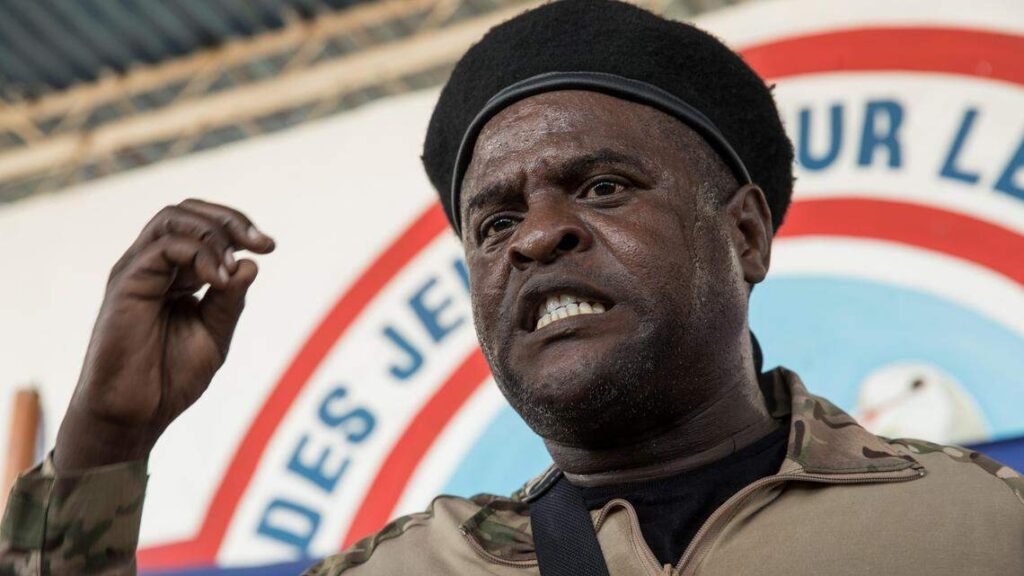On a sweltering July morning in Pasadena, Texas, federal agents closed in on Bazile Richardson, 48, a naturalized U.S. citizen known by several aliases, including Fredo, Fred Lion, Leo Danger, and Lepe Blode. By sundown, Richardson was in custody, facing charges that prosecutors say tie him directly to Haiti’s most notorious gang leader, Jimmy “Barbecue” Cherizier.
An indictment unsealed in Washington, D.C., lays out an alleged conspiracy stretching from the gang-controlled neighborhoods of Port-au-Prince to the heart of the Haitian diaspora in the United States. Prosecutors accuse Richardson of raising and transferring U.S. dollars to Cherizier in violation of federal sanctions, helping fund a reign of terror in Haiti.
Full Indictment
OpaMusic.com is making the full 20-page indictment against Bazile Richardson available to readers. You can review the document yourself to see the detailed allegations and evidence outlined by federal prosecutors.
Cherizier is the architect of G9 Family and Allies, an unprecedented gang federation, and its political offshoot, Viv Ansanm. Once a Haitian National Police officer, he is now Haiti’s most infamous fugitive, accused of orchestrating kidnappings, massacres, and turf wars that have paralyzed Port-au-Prince.
Cherizier Responds via Social Media
In a recent video posted to social media, Cherizier offered what he called a “conditional collaboration” with the FBI but denied ever receiving U.S.-based funding. His statement contradicts the indictment’s allegations that Richardson funneled money to him from the Haitian diaspora.
The U.S. Treasury sanctioned Cherizier in December 2020, designating him as a Specially Designated National for his role in severe human rights abuses, including the 2018 La Saline massacre, which left 71 dead, burned more than 400 homes, and saw at least seven women raped.
For the United States, Cherizier is considered more than a Haitian problem; he is viewed as a hemispheric threat. The State Department has offered up to $5 million for information leading to his arrest or conviction.
The U.S. Connection: Richardson’s Alleged Role
According to the indictment, Richardson acted as Cherizier’s financial lifeline in America. Federal prosecutors allege he tapped into the Haitian diaspora to solicit funds—sometimes directly, sometimes through social networks—before routing the money to Haiti via intermediaries.
Court records claim Richardson sent proof-of-transfer receipts back to Cherizier, confirming that the funds had arrived. Investigators say this money was used to pay gang members and purchase firearms from Haiti’s black market, not for humanitarian projects or community aid.
How the Alleged Scheme Worked
The indictment outlines four main steps in the alleged operation:
-
Direct solicitations from diaspora members sympathetic to Cherizier’s cause.
-
Transfers to intermediaries in Haiti to disguise the true recipient.
-
Proof-of-transfer receipts sent back to Cherizier’s circle.
-
Use of U.S. dollars to pay gang payrolls and acquire weapons.
Prosecutors say the scheme began after Cherizier was sanctioned in December 2020, meaning each transfer could violate U.S. law.
Diaspora Under the Microscope
The Haitian diaspora sends billions in remittances each year, keeping families afloat in Haiti’s struggling economy. But federal investigators allege that a small portion of these funds is being siphoned into gang operations.
For law enforcement, Richardson’s case highlights how gang networks can embed themselves in diaspora communities, using personal trust and cultural ties to raise operational funds.
The investigation involved:
-
FBI Miami and Houston Field Offices
-
Homeland Security Investigations in Washington and Miami
-
Bureau of Alcohol, Tobacco, Firearms and Explosives
-
Drug Enforcement Administration
-
U.S. Attorney’s Offices in Florida, Texas, and North Carolina
“This is not just about gang crime in Haiti,” said Assistant Attorney General John A. Eisenberg. “It’s about U.S. soil being used to bankroll a violent criminal enterprise abroad.”
Large portions of Port-au-Prince are now under gang control. Government influence has been reduced to a fraction of the capital, with schools closed, hospitals attacked, and humanitarian convoys forced to negotiate with armed groups.
Cherizier presents himself as a political leader uniting gangs against the Haitian government. Critics dismiss this as a public relations move designed to mask criminal control with political rhetoric.
Richardson is scheduled to appear in federal court in Washington, D.C., where prosecutors will present their case. Cherizier remains a fugitive in Haiti, with the $5 million bounty still in effect.
If convicted, Richardson faces years in federal prison. For Cherizier, the indictment may not result in immediate capture, but U.S. authorities have signaled they are determined to target his enablers—no matter where they are.
At a Glance: Bazile Richardson & Jimmy “Barbecue” Cherizier Case
Arrest Date:
-
July 23, 2025 – Bazile Richardson arrested in Pasadena, Texas
Defendants:
-
Bazile Richardson – U.S. citizen, also known as Fredo, Fred Lion, Leo Danger, Lepe Blode
-
Jimmy “Barbecue” Cherizier – Haitian fugitive, leader of G9 Family and Allies / Viv Ansanm
Charges:
-
Conspiracy to transfer funds from the U.S. to Cherizier in violation of U.S. sanctions
-
Alleged use of funds to pay gang members and purchase firearms
Sanctions Background:
-
Cherizier sanctioned in December 2020 by U.S. Treasury for human rights abuses
-
Linked to the 2018 La Saline massacre (71 killed, 400 homes destroyed, at least 7 women raped)
Bounty:
-
U.S. State Department offering up to $5 million for information leading to Cherizier’s arrest or conviction
Agencies Involved:
-
FBI Miami & Houston Field Offices
-
Homeland Security Investigations (Washington & Miami)
-
ATF, DEA
-
U.S. Attorney’s Offices in Florida, Texas, and North Carolina
Currently:
-
Richardson to appear in federal court in Washington, D.C.
-
Cherizier remains at large in Haiti

